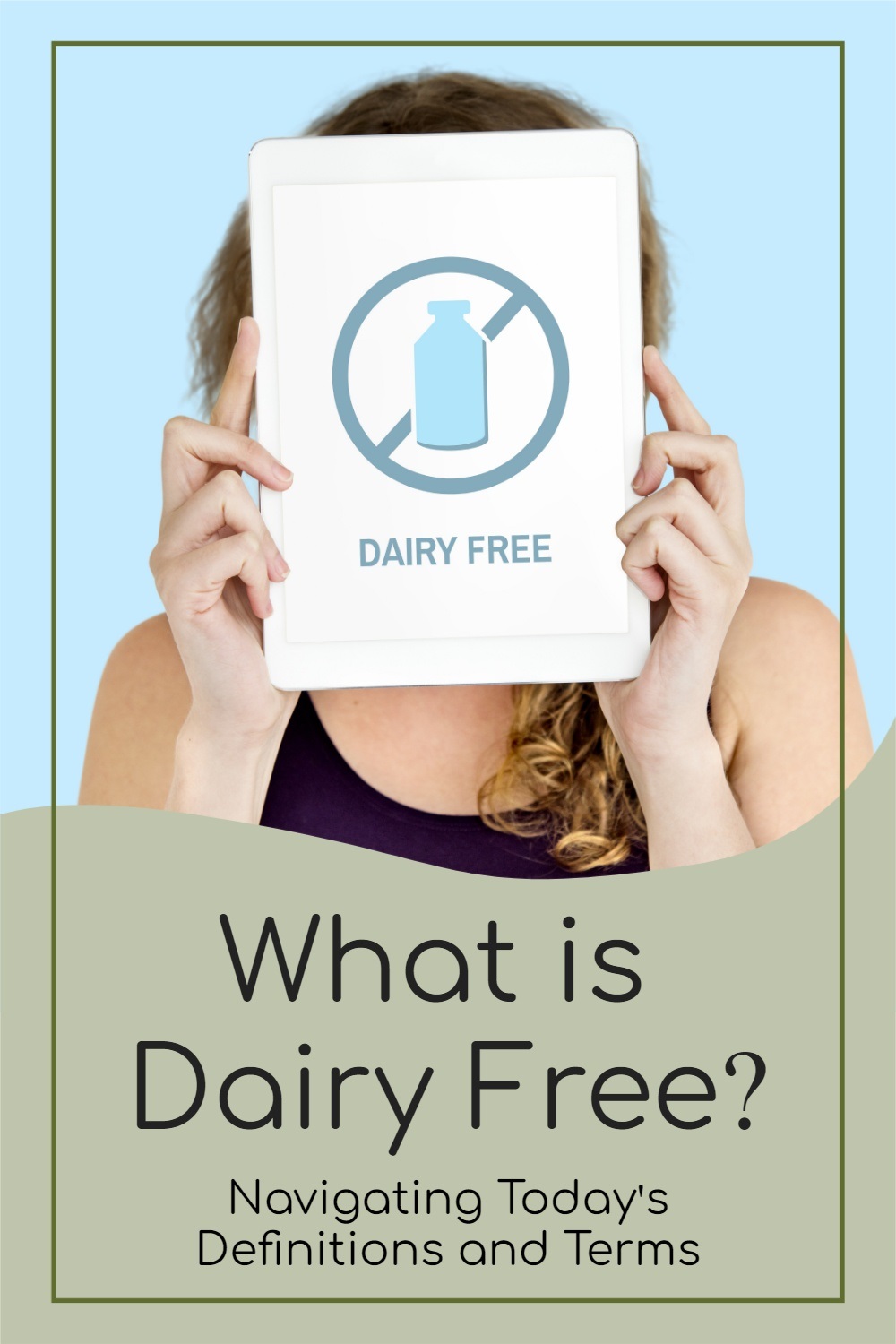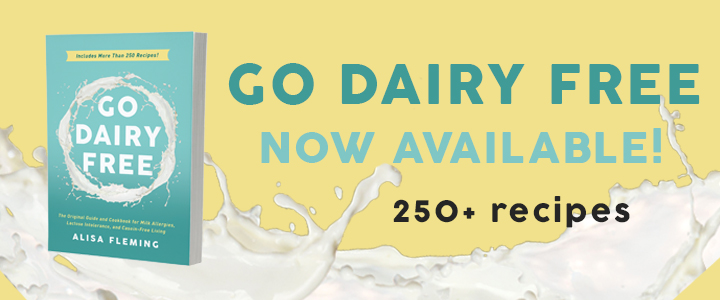It seems like a simple question, and it does have a simple answer. But there are many reasons why people can get confused, particularly as marketing vocabulary and product development expand. So what is dairy free? Let’s start with a couple basic definitions:
Dairy: containing or made from mammal milk (cows, goats, etc).
Dairy Free: made without ingredients derived from mammal milk.
In other words, a food or beverage that does not contain an ingredient derived from any component of mammal milk is considered to be dairy free. I cannot emphasize the word “ingredient” enough. Dairy ingredients include obvious forms of milk, like cheese and butter, and extracted forms, like casein, whey, lactose, and even milk fat. If any type of dairy is in an FDA-regulated food product it should be clear on the ingredient statement. But there are many other terms used on food labels and by people, which are essential to understand. You can jump ahead to these terms and answers to other FAQs with these links:
- Is Dairy-Free a Regulated Term?
- Does Non-Dairy Mean Dairy-Free?
- Does Milk-Free Mean Dairy-Free?
- Does Lactose-Free Mean Dairy-Free?
- Does Dairy-Free Mean Lactose-Free?
- Does Dairy-Free Mean Egg-Free?
- Does Dairy-Free Mean Vegan?
- Does Vegan Mean Dairy-Free?
- Does Animal-Free Mean Dairy-Free?
- Are Goat and Sheep’s Milk Products Dairy Free?
- This Product Says “May Contain Milk,” How Can it Be Dairy Free?
- Does Dairy-Free Mean Milk Allergen Safe?
- Is there a Dairy-Free Certification?

What is Dairy Free? How to Navigate the Terminology
The definitions might be straight-forward, but there are many other terms that can be correctly or mistakenly construed as dairy free. I’ll cover those, and a more in-depth definition of dairy free using frequently asked questions.
Is Dairy-Free a Regulated Term?
No, the FDA does not have an official definition for “dairy-free” and they do not regulate its usage. That said, milk is a top allergen, so company’s should not be using this term on products with any dairy ingredients (there’s that magic word again). To date, we have not seen a packaged product mislabeled as “dairy-free” specifically, but it can happen. Always read the ingredients!
Does Non-Dairy Mean Dairy-Free?
By formal definition, yes, but in practice, usually. The Oxford definition of non-dairy is “containing no milk or milk products.” It’s equivalent to dairy free. But due to prior FDA regulations, some foods that actually contain milk are labeled as non-dairy. To be clear, most “non-dairy” foods are free of milk ingredients, but there are a handful that aren’t. See our Non Dairy Definition for more details.
Does Milk-Free Mean Dairy-Free?
In theory, yes, but it isn’t a commonly used term on products. Milk-free also means made without any milk or milk derived ingredients. But due to the fact that there are many dairy-free products marketed as “milks” (almondmilk, oatmilk, etc) this label isn’t used often on packaging. I hear it used by people in conversations, and see it used in some writings. But product marketers tend to fear the term milk-free might cause confusion.
Does Lactose-Free Mean Dairy-Free?
No. Lactose is the sugar in dairy milk. A product that has had the milk sugar removed can be labeled as lactose-free, but it might still be made with dairy milk or other milk-derived ingredients. For example, lactose-free milk is still dairy milk, with all of its proteins and other nutrients intact, but the milk sugar has been removed. Lactose-free milk is suitable for many people who are lactose intolerant. But it isn’t fit for people who are allergic to milk protein or for most people who avoid dairy for other reasons.
Does Dairy-Free Mean Lactose-Free?
Yes! If a food or drink is made without dairy, that means it should be made without any milk-derived ingredients, including lactose.
Does Dairy-Free Mean Egg-Free?
No. The eggs in our food supply come from chickens or other birds, not mammals like cows, and are not derived from milk. To better understand the confusion around eggs, see this post: Are Eggs Dairy?
Does Dairy-Free Mean Vegan?
No. Vegan is defined as products that use no animal-derived ingredients, including milk, eggs, meat, fish, and honey. Dairy free products can contain non-milk, animal-derived foods, like eggs, meat, fish, or honey.
Does Vegan Mean Dairy-Free?
It’s complicated. In theory, yes. As mentioned above, vegan means a food contains no animal-derived ingredients, including milk. But it’s important to note a couple caveats.
First, I have come across several products incorrectly labeled as vegan that actually contain dairy. I have also seen vegan labels on menu items that contain dairy. The term vegan seems to correlate with more misuses and labeling mistakes.
Second, companies are now genetically engineering milk proteins which may be labeled as vegan. They insert specific cow genes into fungi or other organisms that allow them to produce milk proteins. These proteins are then used to create vegan “dairy” products. Creepy? Indeed. It’s dangerous, too. These are bioidentical milk proteins, which can elicit allergic reactions. But many people still classify them as vegan, since no animals are used in the production process.
Does Animal-Free Mean Dairy-Free?
It should, but no it doesn’t. In a strange attempt to avoid confusion around the above-mentioned genetically engineered milk proteins, companies are using “animal free” labels. Consequently, many of the new animal-free products are straight up dairy products.
I hope that companies soon realize the conflict with this term. If you insert cow genes into a non-animal organism so that it can create animal proteins, doesn’t it then become part animal? By their very own claims, they are using cow (animal) DNA to create “real” milk proteins. Aren’t these still animal proteins? I digress.
Are Goat and Sheep’s Milk Products Dairy Free?
No, dairy encompasses all food and beverage products that contain the milk of mammals. This includes not only cows, but also sheep, goats, buffalos, camels, etc. When you speak of dairy farms, people in the U.S. usually think of cows. But there are goat, sheep, buffalo, and even camel dairy farms.
This Product Says “May Contain Milk,” How Can it Be Dairy Free?
“May Contain” labels are voluntary, unregulated statements on food labels that are typically more about protecting company liability than educating consumers. In theory, they are telling consumers that there is possibly some degree of risk, at some point in the supply chain or production process, for some degree of potential cross contamination with an allergen. But ALL products are at some degree of risk for potential cross contamination with an allergen. Those labels do not indicate the actual risk level, allergen protocols used, etc.
Some brands that use “may contain” labels actually follow stricter allergen protocols than ones that don’t use them. If potential allergen cross-contamination is a concern, you must always contact the company directly to learn their processes and assess the risk level. No label can replace your own due diligence and only you can decide what is safe for your needs.
Dairy-free addresses ingredients specifically – no milk ingredients – because that is the only constant that can firmly be stated. Read this post: What are “May Contain” Allergy Statements and What They Mean for You.
Does Dairy-Free Mean Milk Allergen Safe?
As mentioned above, it’s a term based on ingredients, not a safety guarantee. No one can guarantee that anything is safe for every person and every situation. We’ve spoken with manufacturers who specialize in producing “allergy-friendly” products, and even they state it’s impossible to ensure any food is 100% free of any trace of an allergen. What they can do is test allergens to below a threshold that has been deemed “non allergenic.”
If potential cross-contamination is a concern for you, then you must contact companies to find out what protocols they use to segregate and/or test for allergens. I know, it’s a lot of work, and it’s frustrating to have food allergies. But only you can decide if a product is safe for your needs. Labels can act as a quick front line to help narrow down options, but they can’t replace personal due diligence.
There are several companies that use dedicated milk-free manufacturing facilities, but it is still essential to contact them and discuss their ingredient sourcing if dealing with a highly sensitive milk allergy.
Is there a Dairy-Free Certification?
I have spoken with certifiers who have discussed the idea of a certification, but I’ve only seen one decide to take it on. And not many food companies have opted to employ them. It’s a risky proposition to step in as a middle man to certify something is free of a top allergen, and milk is a top allergen. As noted above, labels are a helpful front line. But they should never be relied upon completely, even if they have the stamp of a certifier. That agency doesn’t now your specific needs. And they aren’t there everyday, to ensure there aren’t any mistakes, sourcing changes, or lapses in allergen protocols.


4 Comments
“Dairy Free” is possibly even a scarier word than non-dairy. The FDA does not have any definition or regulations to the term dairy-free. While the FDA does regulate the term non-dairy, those regulations are ludicrous and pointless. Where did you find your information that the term dairy free and vegan means there is no dairy? This is in fact false.
Hi Tasha, as mentioned, dairy-free and vegan products “should” always be made without dairy. There are no guarantees in life due to simple things, like human error. Keep in mind that there IS a truth in labeling law that encompasses making any types of false claims. If a company has labeled a product as dairy-free or vegan that actually contains a dairy ingredient, then you should report this to the company. If they do not respond, then you should report it to the FDA. I have had to contact a few companies over the years for falsely labeling a product “dairy-free” and each of them fixed the issue immediately. In each case, it was an oversight or a misunderstanding of ingredients (human error). As mentioned above, potential cross-contamination is a different issue, and should be assessed individually.
Pingback: Dairy-free Ranch | Healthy eating on a college budget
Pingback: Product Review: PRO BAR bite Organic Energy Bar – Making Waves Outreach ⚘ Flyers For Animal Rights